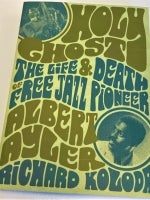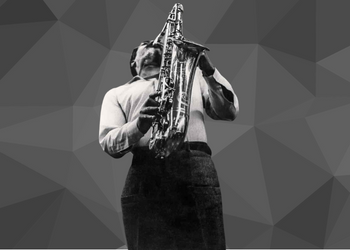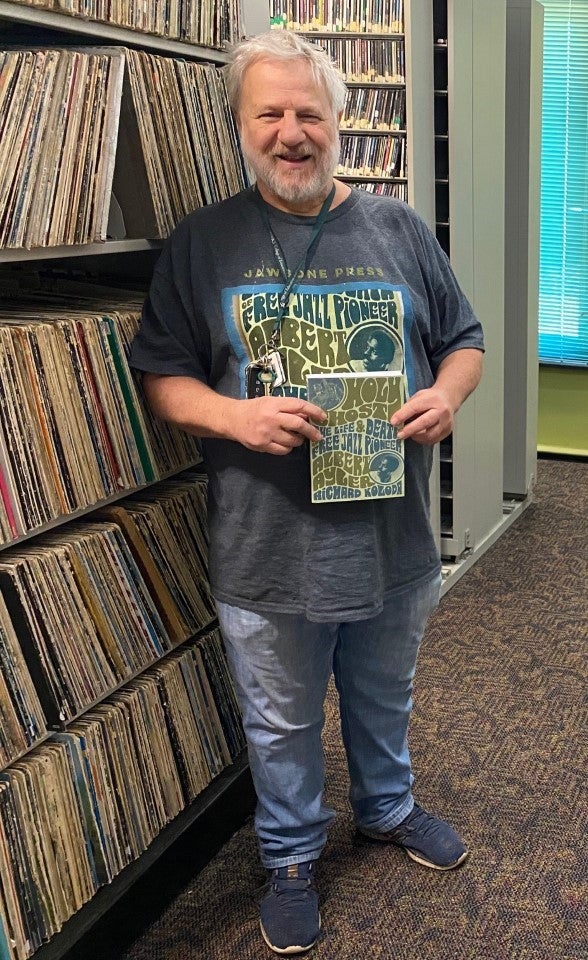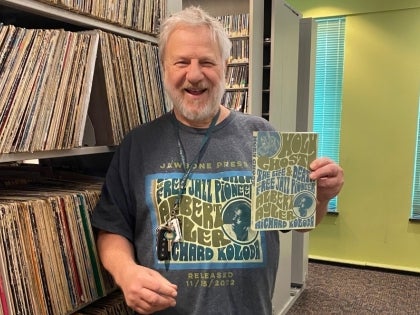Koloda's "Ghost" Details Life, Death of Jazz Iconoclast

CSU alumnus delivers "Citizen Kane"-like oral history on jazz mysterion Albert Ayler that is at once a music biography and detective thriller.
Rare is a story that fits a Venn diagram connecting Cleveland State University, Current Events, History and "Alumni in the News," while simultaneously nodding April as Jazz Appreciation Month and National Literature Month.
But we think we've found it.
At the end of last year, CSU alumnus Richard Koloda published the book “Holy Ghost: The Life and Death of Free Jazz Pioneer Albert Ayler” (Jawbone Press). Equal parts music bio and detective thriller, “Holy Ghost” is a “Citizen Kane”-like oral history that tracks the Cleveland-born avant-garde jazz legend from here to France and back.
Adding layers of mystery and intrigue already surrounding the sax player, vocalist and composer who died in 1970 at age 34, Koloda’s tome on Ayler was critically hailed upon release. Recently shortlisted for the biography/autobiography category in the 2023 Jazz Journalists Association Book Awards, the final award will be voted on by the JJA’s professional membership with results announced in May.
Koloda, a Northeast Ohio lawyer with both a master’s degree in Musicology and a Juris Doctor from CSU, has contributed to past Ayler projects—including a multi-disc retrospective dubbed “the Sistine Chapel of Box Sets,” and a Swedish biopic film by noted documentarian Kasper Collin.
He also has hosted several jazz programs on CSU’s radio station, WCSB-FM/ 89.3, including “The Jazz from Outer Space Make-out Hour.”
Perhaps most importantly, Koloda was also a friend of Ayler’s trumpeter brother Don—a mysterious musician in his own right—who encouraged the author to put pen to paper on an oral history about his idiosyncratic brother and his push to create that would later inform Afrofuturism.

An Iconoclast Gone Too Soon
Albert Ayler (left) was born in Cleveland, raised in Shaker Heights and graduated from John Adams High School in the mid-1950s. He later studied at the Academy of Music in Cleveland with jazz saxophonist Benny Miller, gaining a foothold on bebop style and standard repertoire. He would later earn the nickname “Little Bird,” an homage to Charlie “Bird” Parker, in Cleveland’s strong-but-diminutive jazz scene.
After a stint in the US Army and some “wandering years,” Alyer settled into New York City’s avant-garde jazz community, where he became a bit of a cult figure despite not catching on with larger audiences.
The words “heretic,” “charlatan,” “genius,” “visionary” and “insane” were all thrown around about Albert Ayler’s style in equal measure. His “highly experimental and radically unique” musical pocket of sorts was described as “formless,” peppered with esotericism and deeply-personal spirituality recalling the Fourth Way, as well as flying saucers and apparitions of the apocalypse.
As Koloda’s book intimates, most serious jazz listeners didn’t know what to make of Ayler (or his brother).

These burdens weren’t shared in equal measure by jazz iconoclasts like Le Sony’r “Sun” Ra, who mined from a similarly mysterious earth. Albert Ayler did appear to influence (and be influenced by) the legendary John Coltrane, who occasionally loaned him money during particularly hard times.
“Whatever the [Ayler] brothers saw—or thought they saw—made a deep impression,” Koloda (left) said at the book apex. “But while many people found it delightfully hip to accept Sun Ra as an alien from Saturn on a mission to preach peace, a number of those same critics and fans scorned Ayler for his visions.”
Koloda links this revelation to Village Voice critic Richard Mortifoglio, who believed that Ayler was struggling with mental illness and “was able to harness his schizophrenia for coherent social ends… A great moral artist, Ayler, like [the poet and novelist Rainer Maria] Rilke, experienced these historical fissures deep enough to resolve them in an art of healing, compensation and growth.”
Ultimately, Ayler’s death at the age of 34 only fortified his legend status: he was found floating in NYC’s East River of an “apparent suicide.” The reasons behind his suicide remain unclear. Some (like Mortifoglio) point to mental health and depression at the time of his death. Others believe Ayler was increasingly disillusioned with the music industry and his struggle to gain recognition and acceptance for his avant-garde style of jazz. Koloda leans into familial emotional abuse as a factor.
In the years leading up to his death, Ayler had experienced several personal and professional setbacks. He had been dropped by his record label and was struggling financially, and he had also experienced the loss of several close family members. To that end, Koloda’s reconstruction of Ayler’s life is remarkable because the facts surrounding his mythology were often so notional.
Koloda’s Pagoda
Koloda said that this went beyond a passion project, segueing into what he calls “obsession” territory. The book’s birth to publication timeline reflects what Koloda calls “a journey.”

“The manuscript was completed in 2005, but it did not get picked up by a publisher,” recounted the author in a recent interview with CSU. “But as it turned out, that was best for what came out. As a work stitching oral history and archival material, things continued to be revealed with each passing year.”
The author confided that his project didn’t start fervently, but collaboration and ongoing discussion with Ayler’s brother Donald would ultimately stoke the fire and that kept him going on the manuscript.
“I kept getting these new perspectives, tidbits, clarifications on things… it eventually felt like hunger, which is funny. Given that I started out feeling ambivalent about doing the book because I was in law school at the time and cramming for the Bar. I’d find something new that would drive me to more. If I had access to something or awareness of something, I added it. Right away. The manuscript did get unwieldy after a while—it was almost like a doctoral dissertation for a while,” Koloda said.
“Couldn't help that. I wanted to write something more than a jazz book. I wanted to create something that felt like you were there for it all.”
The trick, then, was to “take everything from there and pare it down to a very readable, digestible book that made you feel like you were there,” he said. To that end, Koloda makes the case for just how influential Ayler was on today’s music and caps the work with a quote from poet Ted Joans:
“Angels of jazz, they don’t die, they live, in hipsters like you and I.”